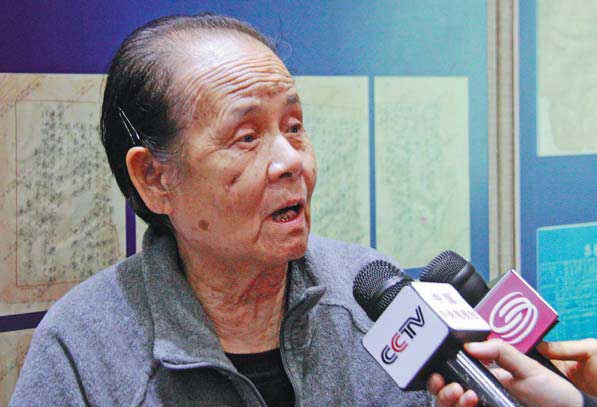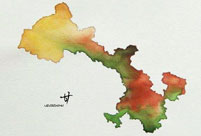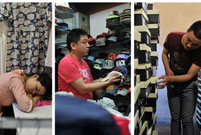 Motorcycle stunt on the Bund
Motorcycle stunt on the Bund
 French Spiderman Alain Robert climbs up Galaxy Hotel in Macao
French Spiderman Alain Robert climbs up Galaxy Hotel in Macao
 Africans in Guangzhou
Africans in Guangzhou
 Pole dancer shows strength and beauty up in the air
Pole dancer shows strength and beauty up in the air
 College girls call for protection of ecological space on earth
College girls call for protection of ecological space on earth
 Top 10 celebrities driving auto brands
Top 10 celebrities driving auto brands
 10 low-carbon tips to save money
10 low-carbon tips to save money
 Luxury cars make Asia premiere at Auto China
Luxury cars make Asia premiere at Auto China
 Versatile dog
Versatile dog
 Ni Ni covers BAZAAR JEWELRY
Ni Ni covers BAZAAR JEWELRY
 |
| Zhao Sujuan, 81, a retired staff member of Jilin Provincial Archives, discusses the Japanese occupation of China. (China Daily/Song Wei) |
Sex slaves
Some of the files are related to the Japanese army's systematic abuse of female sex slaves. One report, written on Feb 28, 1938, describes how in just 10 days, 8,929 Japanese soldiers "visited comfort stations" in Zhenjiang, Jiangsu province. Another report, dated mid-February, details how a shortage of comfort women in Danyang, Jiangsu province, resulted in enforced enrollment of local women.
A record of a phone call describes how the acting manager of the branch of the regime's central bank in Anshan, Liaoning province, and the bank's Foreign Capital Division of Fund Department granted permission for the dispersal of more than 200,000 yen ($1,950) for the purchase of comfort women.
Japan is the only country whose military has enforced comprehensive sexual slavery, according to Su Zhiliang, a professor at Shanghai Normal University, who specializes in studies related to the issue.
"We should distinguish these women from prostitutes. The 'comfort women' were slaves. They were forced, not paid, and had no personal freedom. Numerous women were affected across Asia," he said.
Unit 731
The archives also shed light on how the Japanese army conducted bacteriological tests on prisoners of war. Although Unit 731, the detachment that conducted the tests, remains almost unknown outside China and Japan, the documents show that spies and those suspected of actively resisting the occupation were handed over to the unit.
Records kept by the Kwantung Kempeitai show that 277 people were transferred to Unit 731, including Chinese, Russians and Koreans. The name of Lee Jisua, a 28-year-old Korean national, is one of many etched into the fabric of a museum in the Pingfang district of Harbin, the capital of Heilongjiang province. The walls of a long corridor used as a secret conduit through which those selected to undergo testing were herded bear 2,995 names written closely together
"We have a lot of documents and audio interviews with former members of Unit 731 that document the cruel testing procedure. We also have testimony from laborers who were forced to build the site. Japan's genocide and crimes against humanity didn't just harm the immediate victims, but also undermined society's moral values," said Wang Xiliang, a researcher at the Institute of Japanese History at the Heilongjiang Provincial Academy of Social Sciences.
"The archives related to the laborers enslaved by the Japanese military tell of strict management and the cruel suppression of those who had been enslaved, most of whom were Chinese or Allied POWs," said Mu of the Jilin archives.
Conditions were tough for the Chinese laborers. One archive describes how 10,000 men were forced to work on the construction of a military project. When a large number of workers attempted to escape, they were captured and thrown into a pit. Water cannons were used to stop them from climbing out of the pit, where they either drowned or were buried alive.
Obstacles
According to the Jilin Provincial Archives, the 89 files constitute just a tiny fragment of the records. The archive plans to release more files to help the general public gain a better understanding of the history of the occupation.
Since Shinzo Abe came to power in December 2012, the Japanese prime minister has allowed cabinet members to visit the Yasukuni Shrine in Tokyo, which commemorates Japan's war dead, including 14 Class-A convicted war criminals, and is seen by many as a symbol of Japan's militaristic history.
"The frequent visits to the shrine and Japan's attitude toward its wartime history are major obstacles to the process of mending relations between Japan and its neighbors," Professor Wang Jianxue said.

 Hand-painted maps go viral online; painter's name remains unknown
Hand-painted maps go viral online; painter's name remains unknown 4th Beijing Int'l Film Festival ends
4th Beijing Int'l Film Festival ends Commando elite specializes in sign language
Commando elite specializes in sign language Man photoshops himself into girlfriend's childhood photos
Man photoshops himself into girlfriend's childhood photos Photo story: Stallholders at Beijing Zoo Wholesale Market
Photo story: Stallholders at Beijing Zoo Wholesale Market Artists on backstage
Artists on backstage Beckham launches fund to support youth soccer in China
Beckham launches fund to support youth soccer in China Cherry blossoms hit peak bloom in Washington D.C.
Cherry blossoms hit peak bloom in Washington D.C. Children in ancient costumes learn Zhusuan
Children in ancient costumes learn Zhusuan Cute Shaolin boy melts the hearts of millions
Cute Shaolin boy melts the hearts of millions Giant panda Sijia is back to happy life
Giant panda Sijia is back to happy life Richest Chinese of 2014: half from the mainland
Richest Chinese of 2014: half from the mainland Chengdu - laid-back lifestyle makes happiest city
Chengdu - laid-back lifestyle makes happiest city The backstage of the Fashion Week
The backstage of the Fashion Week College students in Han costumes
College students in Han costumesDay|Week|Month